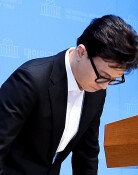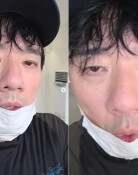S. Korea’s dilemma on military aid for Ukraine
S. Korea’s dilemma on military aid for Ukraine
Posted April. 21, 2023 07:49,
Updated April. 21, 2023 07:49
As for President Yoon Suk Yeol’s remarks about the possibility of military support to Ukraine, a senior official at the presidential office said yesterday, “It is common sense and theoretical answer. But our next move will depend on how Russia behaves.” The official also added that there is no term in South Korea’s domestic laws or foreign ministry directives that bans military assistance to belligerents or third countries. The comment leaves open the possibility that the government’s “no weapons of mass destruction” policy could change going forward, despite strong backlash from Russia.
As the presidential office explained, President Yoon’s statement was common sense and theoretical. However, whether it was necessary to make such remarks on a sensitive issue that will have a significant impact on our foreign relations is another matter. Although Yoon used the hypothetical phrase “in the event of a large-scale attack on civilians, genocide, or grave violations of the law of war,” even the most theoretical statements should have been cautiously filtered in a diplomatic setting where every word is closely interpreted.
It is unlikely that Yoon made the statement without realizing the ramifications it would bring. The presidential office as well as government officials highlight that the remarks were not made without planning. However, it is doubtful that the president fully understood the magnitude and impact of his words. Russia immediately responded by regarding Yoon’s comment as “a reflection of hostilities against Russia.” Dmitry Medvedev, Deputy Chairman of the Russian Security Council, played the card of military aid to North Korea, saying that he wonders how South Korea will react if Russia’s latest weapons are in the hands of North Korea.
So far, the government has been providing humanitarian and financial assistance to Ukraine but refused to provide weapons of mass destruction, given Russia’s influence over North Korea and for the sake of the safety of Korean companies and people in Russia. The government has been under intense pressure from the U.S. and NATO, and Russia has warned South Korea of a “breakdown in relations.” As a desperate effort, the government even resorted to “bypass support” by signing a deal with the U.S. to export or lend 155-millimeter artillery shells to fill the U.S. empty arsenal.
The government’s decision to open the possibility of direct assistance seems to be related to President Yoon’s state visit to the U.S., which is just days away. Ukraine will also be on the agenda at the South Korea-U.S. summit. It is true that South Korea’s contribution is essential to strengthening the extended deterrence against North Korea’s nuclear threat, but the government should be level-headed for national interest when judging if it should be at the expense of Korea-Russia relations. Global universal values and contributions as an ally are important, but none of them can come before the safety of our citizens and businesses.



![[김순덕의 도발] ‘李부터 연임’ 개헌, 이 대통령은 가능성을 말했다](https://dimg.donga.com/c/138/175/90/1/wps/NEWS/IMAGE/2026/01/16/133172656.1.jpg)



